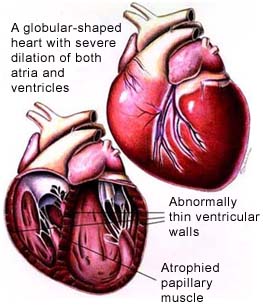Pet Health Library
Dilated Cardiomyopathy in Dogs
Dilated cardiomyopathy is characterized by enlargement of the muscles of the heart. As a result of being stretched, the heart muscles become weakened and the organ looses it's ability to pump blood efficiently throughout the body.

Canine Dilated Cardiomyopathy
Dilated cardiomyopathy has been associated with various conditions that cause damage to heart muscle. Certain nutritional deficiencies such as carnitine deficiency, viral infections such as parvovirus infection, and medications (Adriamycin, an anticancer drug) are linked to this "enlarged heart" syndrome.
In most cases, the cause of dilated cardiomyopathy is unknown. Because the disease is most common in certain large and spaniel breeds, a genetic or familial link has been suggested. Dogs most commonly affected are Doberman pinchers, Boxers, Cocker spaniels, and the giant breeds. Affected dogs are often young, ranging between two and five years of age. Male dogs are commonly affected more often than females.
Symptoms of the disease reflect heart failure. Exercise intolerance, coughing, fatigue, and weight loss are characteristic symptoms for dogs with dilated cardiomyopathy.
X-rays, blood tests, and ECG are helpful in diagnosing the disease. These tests are necessary in order to rule out the possibility of other problems. The definitive diagnosis is made with echocardiography (cardiac ultrasound).
Treatment for dilated cardiomyopathy is mediocre at best. Your veterinarian will recommend the treatment that is best suited for your dog.
Dilated cardiomyopathy is a serious condition. Most dogs only live six to 12 months after the onset of clinical symptoms. Prognosis for Doberman pinchers is worse. Even when stabilized with medication, they often die within three to six months.
[ Search Articles ] [ Article Index ] [ Previous Page ]